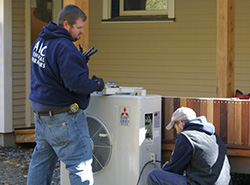
When you walk outside on a freezing December morning in New England, the kind of morning where you can see your breath and there’s snow covering the cold hard ground, would you ever imagine that you could generate heat from that chilly air?
With a heat pump, you can—and you can save money and energy while doing it. Heat pumps use electricity to extract heat from the air or underground and deliver it into your warm house. According to Alex Wilson, founder of BuildingGreen, Inc., heat pumps are a little like magic.
“They move heat from one place to another, and upgrade the temperature of that heat in the process,” he said in an article about the heat pump installation ARC did for him. The most common kind of air-source heat pump is called a ductless minisplit heat pump. It consists of an outdoor compressor, a wall-mounted indoor unit and copper tubing, but requires no ductwork. Heat pumps can also change to cooling mode with the flip of a switch.
A lot of people concerned about saving energy would say that electricity is one of the least efficient sources of energy there is. But heat pumps don’t use electricity to generate heat, they use it to move heat, meaning that they consume less electricity than conventional electric, propane or oil heating systems.
“For every one unit of energy consumed (as electricity), two to three units of energy (as heat) are delivered,” said Wilson. “This makes heat pumps significantly less expensive to operate than oil or propane heating systems in terms of dollars per delivered unit of heat.”
Heat pumps weren’t always the ideal choice for cold climates like New England. But thanks to advances in technology, most heat pumps will function well even at temperatures that dip below zero, making them a viable choice for people in any state to use to transfer the right amount of energy they need for heating and cooling specific rooms.
Contact us to see how you can save money and energy with a cold climate heat pump, and discover a new way to use energy.




